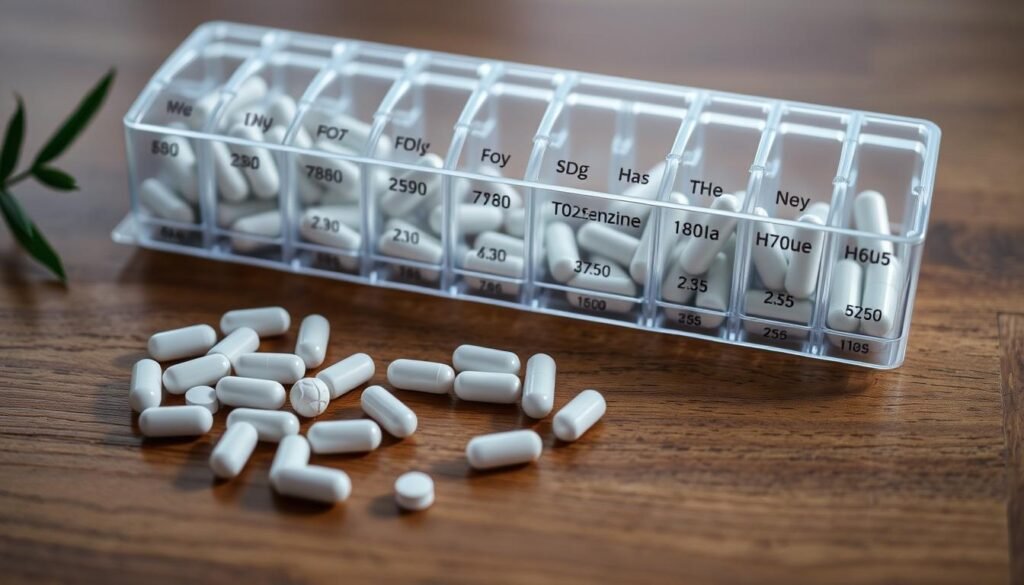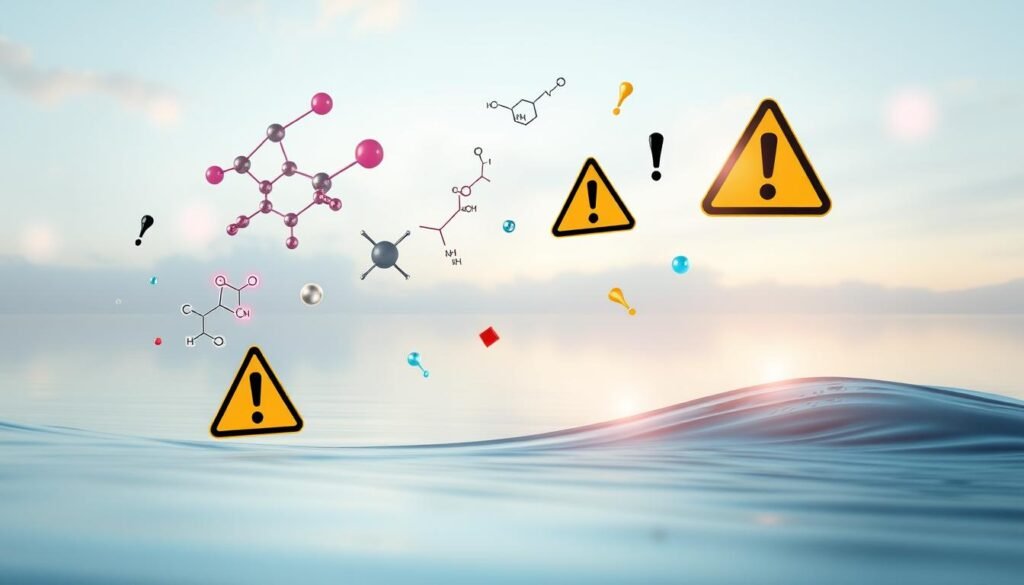Did you know over 30% of adults in the U.S. will face an anxiety disorder during their life? This fact shows why treatments like hydroxyzine are key. Hydroxyzine, an FDA-approved anxiety medication, helps ease symptoms. It’s not the top choice like traditional antidepressants. Yet, it’s very helpful for people with generalized anxiety disorder (GAD) for a short period. Knowing how hydroxyzine works in treating anxiety is crucial for those trying to manage their condition.
Key Takeaways
- Over 30% of U.S. adults experience anxiety disorders, making effective treatments crucial.
- Hydroxyzine is an FDA-approved medication specifically for anxiety relief.
- This medication is especially useful for short-term management of generalized anxiety disorder.
- Hydroxyzine acts by reducing central nervous system activity, offering quick relief from anxiety symptoms.
- Understanding how hydroxyzine works can enhance its effectiveness as part of a broader anxiety management plan.
Understanding Anxiety Disorders
Anxiety disorders are conditions with too much fear or worry. They interrupt daily living.
About 32% of people in the U.S. will face anxiety disorders. We see types like generalized anxiety disorder (GAD), social anxiety disorder (SAD), and specific phobias. Those with these issues often feel restless, have a fast heartbeat, find focusing hard, and don’t sleep well.
These symptoms can lower life quality, causing missed days at work or school. It’s vital to understand these disorders to find the right treatments. Sadly, 60-85% of patients only partially get better with current treatments.
For GAD and SAD sufferers, symptoms can come back or last a long time. This happens more when they also have major depressive disorder (MDD).
The FDA has okayed many medicines for these issues. SSRIs and SNRIs are usually tried first. However, drugs like hydroxyzine are also available for those looking for more options.
| Type of Anxiety Disorder | Common Symptoms | Treatment Options |
|---|---|---|
| Generalized Anxiety Disorder (GAD) | Excessive worry, fatigue, irritability | SSRIs, SNRIs, Hydroxyzine |
| Social Anxiety Disorder (SAD) | Fear of social situations, embarrassment | SSRIs, CBT, Hydroxyzine |
| Specific Phobia (SP) | Intense fear of a specific object or situation | Exposure therapy, SSRIs |
Learning about these disorders helps choose the right treatment paths. Good treatment can greatly improve well-being.
What is Hydroxyzine?
Hydroxyzine is a first-generation antihistamine used in hydroxyzine for anxiety treatment. It is prescribed for anxiety and allergies. It comes in two forms: hydroxyzine hydrochloride (Atarax) and hydroxyzine pamoate (Vistaril). Each type meets different needs and brings symptom relief.
Hydroxyzine has calming effects. Doctors often suggest it for short-term anxiety relief. Studies show it’s good at easing anxiety symptoms. This makes it useful while waiting for other medications like SSRIs or SNRIs to work.
Here are some hydroxyzine medication details for better understanding:
| Formulation | Available Strengths | Brand Name |
|---|---|---|
| Hydroxyzine Pamoate | 25 mg, 50 mg, 100 mg (Capsules) | Vistaril® |
| Hydroxyzine HCl | 10 mg, 25 mg, 50 mg (Tablets) 10 mg/5 mL (Syrup) 25 mg/mL, 50 mg/mL (Solution) |
Atarax |
Hydroxyzine isn’t a controlled substance. This means it’s less likely to cause addiction than some anxiety meds. It’s a safe choice for those wanting to avoid dependency. Knowing about hydroxyzine pamoate helps people choose wisely for their anxiety treatment.
Hydroxyzine Mechanism of Action
Hydroxyzine works in two main ways to lessen anxiety symptoms. It goes after brain chemicals, mainly focusing on histamine and serotonin. By stopping histamine, it makes you feel calm. This lowers your anxiety.
It also helps control your mood by affecting serotonin. This makes it a strong choice for managing anxiety.
Hydroxyzine quickly eases anxiety, which stands out as a key advantage. Studies show its effects kick in soon after taking it. This offers fast help for those feeling anxious. In 2022, around 13 million Americans got prescriptions for it. This shows how much people trust this medication.
The drug gets into your system well and binds to proteins at a high rate, 93% to be precise. Adults break it down in about 20 hours. For older people, it takes longer, about 29.3 hours. Though more research is needed, hydroxyzine’s role in treating anxiety is clear.
Getting to know how hydroxyzine works can help you see if it’s right for you. Always talk to a doctor first. They’ll help you get the dosage just right. You can learn more about dosing at official dosage recommendations.
How Does Hydroxyzine Work for Anxiety
Hydroxyzine helps with anxiety by affecting the brain. It deals with H1 histamine receptors to lower overstimulation. This method helps calm anxiety symptoms.
Effects on Histamine and Serotonin
Hydroxyzine impacts serotonin along with blocking histamines. It keeps more serotonin in the brain, helping you feel calm. This aids in reducing nervousness and agitation.
Impact on Central Nervous System Activity
Hydroxyzine reduces brain excitability. This action helps relax the brain, aiding those with anxiety and insomnia. It improves sleep quality and overall well-being.

Hydroxyzine for Anxiety Treatment
Hydroxyzine is key in treating anxiety quickly, especially during acute attacks. It starts working fast, offering immediate comfort. This is why it’s a top choice for people with sudden anxiety. Let’s dive into hydroxyzine’s role in treatments, how it’s used short-term vs. long-term, and its effectiveness compared to other meds.
Short-term Use vs. Long-term Use
It’s often used for a short time because your body might get used to it. Hydroxyzine helps right away, but might not work as well if taken for too long. It’s great for quick relief when you’re really anxious.
For ongoing anxiety, other meds like SSRIs are better. They help keep anxiety under control over time, which is important for lasting wellness.
Comparative Effectiveness with Other Medications
A study in 2002 showed hydroxyzine is a good, safe option instead of benzodiazepines for anxiety. In research with people having generalized anxiety disorder, 50 mg of hydroxyzine daily was helpful. It doesn’t cause dependency like benzodiazepines, which is a big plus.
Even though it can be very effective, sometimes your doctor might need to adjust the dose or try something else if hydroxyzine isn’t helping enough.
| Medication | Usage Duration | Dependency Risk | Onset of Action |
|---|---|---|---|
| Hydroxyzine | Short-term | Low | 15-30 minutes |
| Benzodiazepines | Short/Long-term | High | 30 minutes |
| SSRIs | Long-term | Low | 4-6 weeks |
Dosage and Administration of Hydroxyzine
Getting the right hydroxyzine dosage is key for it to work well. This medicine comes in different hydroxyzine forms. This variety helps both patients and doctors. It’s important to know the usual doses for the best results.
Typical Dosage Recommendations
The amount of hydroxyzine adults need depends on what they are using it for. For anxiety, people usually take 50 to 100 mg, up to four times a day. They shouldn’t take more than 400 mg in one day. For itching, the dose is usually 25 mg, three or four times a day.
Before medical procedures, a single dose of 50 to 100 mg is common for sedation. Children’s doses of hydroxyzine dosage are adjusted by age and weight. They take their doses throughout the day.
Forms of Hydroxyzine Available
Hydroxyzine mostly comes as pills in 10 mg, 25 mg, and 50 mg strengths. For those who don’t like pills, there’s also hydroxyzine syrup. These hydroxyzine forms fit different needs. This lets doctors give people the right kind of treatment. To learn more about hydroxyzine, its possible side effects, and how to use it, go to this resource.

Common Side Effects of Hydroxyzine
Hydroxyzine is known for its anxiety-relieving benefits. But, it can cause mild side effects. These effects are often temporary, especially when you start treatment. Common issues include:
- Drowsiness
- Dizziness
- Blurred vision
- Dry mouth
- Headaches
It’s important to be aware of these potential side effects when starting hydroxyzine. While the medication is generally well-tolerated, keeping an eye on any adverse reactions is key. Serious side effects, like allergic reactions or changes in heart rhythm, need quick medical help.
The medication comes in different strengths, like 10mg, 25mg, and 50mg tablets, and a liquid form. The tablets are easy to identify by color and special marks. This helps healthcare professionals prescribe the right dose.
Older adults, those 65 and above, might react more strongly to hydroxyzine. They may require changes in their dosage. Knowing about possible side effects can help manage treatment better.
Warnings and Precautions
When thinking about using hydroxyzine for anxiety, knowing the warnings for hydroxyzine use is key. There are several precautions you need to take seriously. Be aware of how hydroxyzine might interact with other medicines you’re taking.
Interactions with Other Medications
Hydroxyzine can have bad interactions with many medications, causing serious side effects. It’s important for patients to tell their doctors about all medicines they are taking. Some drugs that may not mix well with hydroxyzine include:
- Antidepressants (e.g., citalopram, fluoxetine)
- Antipsychotics
- Opioids
- Muscle relaxants
- Monoamine oxidase inhibitors (MAOIs)
Mixing hydroxyzine with these can make you extra sleepy or cause breathing problems. There are 583 known drug interactions with hydroxyzine, including 92 major ones. This shows we must be very careful.
Conditions that May Disqualify Usage
Some health issues make hydroxyzine riskier. Talk to your doctor if you have any of the following:
- Heart diseases, especially with a history of long QT syndrome
- Narrow-angle glaucoma
- Respiratory diseases
- Allergy to hydroxyzine
Older people might need a different dose because they are more likely to get side effects like sleepiness and low blood pressure. Using hydroxyzine might not be safe during pregnancy and breastfeeding. We don’t know how it affects the baby. This is why talking in detail with a doctor about your health is crucial.

Hydroxyzine and Stress Management
Hydroxyzine is key in managing stress, especially during intense anxiety episodes. Many find themselves seeking fast relief when overwhelmed by stress. This medication delivers quick hydroxyzine and anxiety relief, enabling users to calm down and tackle challenges more effectively.
Its Role in Acute Stress Situations
Hydroxyzine’s fast-acting calming effects shine in high-stress situations. Relief often comes within 30 to 60 minutes of taking it. This allows people to handle acute stress without long-lasting anxiety.
This immediate effect positions hydroxyzine as a top choice for those avoiding addiction risks. It’s beneficial, as it’s not a controlled substance.
Benefits for Sleep-related Anxiety
Hydroxyzine also excels in treating sleep-related anxiety. It’s a big help for those struggling with insomnia caused by anxiety. The medication’s effects on sleep support a good night’s rest.
It encourages relaxation and reduces anxious thoughts. This helps individuals fall asleep without relying on stronger sedatives. So, it’s a solid choice for fighting both anxiety and sleep issues.
For more details on hydroxyzine, including side effects and contraindications, visit this reliable source. As hydroxyzine gains recognition for its anxiety and sleep benefits, it stands out as a versatile tool for those battling stress in their lives.
Conclusion
Hydroxyzine is a strong choice for managing anxiety. It works fast, often in about 30 minutes to an hour. Studies show it’s better at treating anxiety disorders than a placebo.
This medicine is as good as benzodiazepines and buspirone but watch out for drowsiness. It’s safe for both short-term and long-term use. Your doctor can make a plan that’s right for you.
Hydroxyzine offers a new hope for those fighting anxiety, leading them toward improved mental health.